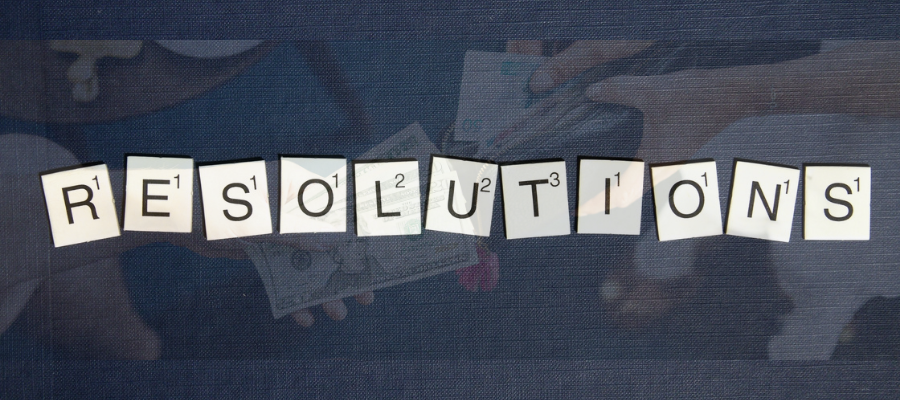
Want this year to be the year you finally turn your finances around?
Try these two simple “resolutions” on for size, or just think of them as easy ways to make progress toward your financial goals!
Video Broadcast Version
Audio Podcast Version
Also available on iTunes, Stitcher, and wherever else you listen 🙂
Resources Mentioned in This Podcast & Video:

Deni: Well, hello and welcome everyone. I hope your holidays were fairly smooth and I’m going to jump right in. Please, if you have any questions or you have, you just want to let us know where you’re coming joining us from, just put it in the comments. We are, you know, last week we talked about tax, which is always fun, a bit more fun. We’re going to go into some resolutions to get richer, you know, losing weight and all that stuff here. Just two easy resolutions to get richer in 2022. So again, please feel free to put comments and ask questions. It doesn’t even have to do with this subject. Just go ahead and ask anything. And with that, we’re going to jump right in. So, Brian, tell us what the number one?
Brian: Right, so you don’t think the taxes are fun, right? Yeah. Ok. So last week we talked about, you know, the tax, the tax implications of giving real estate to children or charities, you know, giving being a good a good theme for Christmas week and the holidays in general. Tim Dooley says as always, checking in from the redneck Riviera, that sounds. That sounds fun, Tim. I have not been to the redneck Riviera, but I have watched Ozark, which doesn’t necessarily paint it in the best light, but it still looks like a fun place to be. All right, resolutions, we’ve got to find New Year’s resolutions for you for a richer, wealthier 2022. And you know, here’s the thing about resolutions is that most people don’t keep them right. If you go to the gym in January, it’s packed with resolutions and you know, and the regulars at the gym roll their eyes and they know that by the third week in January, all the resolutions will be back sitting on the couch and, you know, not crowding up the gym anymore. So, the thing about resolutions is if you want them to stick, they have to be easy and easy as maybe the wrong way of putting it. But you need to keep them manageable. You need to be able to create a habit that you can actually stick with. You know, whether it’s daily, weekly, monthly, whatever you need to be able to stick with it. So, we’ve got two resolutions for you today. Wealth and money-related resolutions are both super simple, super easy to maintain, and the first of those resolutions is to automate your investments, your non-property investments because you can’t automate buying individual rental properties, right? I mean, there’s skill and labor involved to a degree.
Brian: Well, I mean, not direct ownership of properties. There are other types of real estate investments you can automate, and we’ll get into those in one second. But you know, direct real estate investment still takes some labor. It takes some expertise. You can’t automate it, but you can’t automate your other investments, freeing up your time and your mental bandwidth for your real estate investments so stocks you can automate your investments with a Robo advisor. I personally use Charles Schwab. They have a good one. It’s totally free. The problem with Schwab is that you do need a minimum investment of five thousand dollars, which not everyone has when they’re getting started with investing. So, if you don’t have $5000 but you do want to get started with a Robo advisor, try either SoFi Invest or try Ally Invest. Those are both free as well, both good services. All three of those are great Robo advisor platforms. They will give you a questionnaire. When you first sign up. You will answer questions about your age, your risk tolerance, your financial goals, and then they will propose an investment portfolio and for your approval. Or you can go back and tweak your settings and then they’ll manage your investments for you. And you can set up automated recurring transfers of money into your Robo advisor account. And they will invest the money for you, and they’ll rebalance your account for you and keep your money allocated the way that you have set up.
Deni: They look at things like risk and age and all of that stuff.
Brian: Absolutely, absolutely. So, yeah, I automate the majority of my stock investments with a Robo advisor, and I have mine set up so that every single week a certain amount of money transfers through my checking account over to my Robo advisor account. It just happens in the background. I don’t have to think about it. I’ll have to worry about it. I don’t have to. I don’t even have to log in. It all just happens in the background. So, you can, but you don’t have to set yourself up weekly. You can set it up biweekly, like on your payday, you can set it up monthly, you know, whatever you want to do. All right, so that’s stocks. You can also automate real estate crowdfunding investments. So, there are three. That I particularly like and that I invest in a lot myself. The first of those is fund dries, and they specialize more in apartment buildings across the country. I also like StreetWise, which specializes in commercial buildings and particularly office space in secondary and tertiary cities. Cities like Raleigh, North Carolina, you know, as opposed to like New York City or L.A. or San Francisco, like the really expensive primary markets. They avoid those more expensive markets, and they focus on these more like secondary and tertiary markets. And the third real estate crowdfunding platform that I invest in is a ground floor, which actually works differently. Those are not retail funds that you invest in. It’s rather individual loans, and you can pick and choose individual loans to put money towards, and you can put as little as ten dollars towards any given loan. So, you can spread out
Deni: I like ground floor.
Brian: I love ground floor. It’s great. And you know, with all three of those crowdfunding platforms, you’re looking at an average annual return of around eight to 10 percent. So pretty equivalent to the long-term average of the stock market, but much more stable and secured by real estate. So, you know, they can’t disappear entirely, right? As opposed to a company that you have stock in going bankrupt, which can disappear overnight. And by the way, fundraise also has a minimum investment of $10, so you can get started with either one of those, too. With $10, you don’t need to have, you know, a boatload of money. You don’t need to be, you know, swimming in your stacks of gold coins. You can start really simple and easy. And again, with all three of those, you can set up automated, recurring contributions to your account.
Deni: I like the fact that it starts with lower funds, too, because you can get to understand and learn it without, you know. Too much of a. You know, investment in the beginning,
Brian: Yeah, you can dip your toe in the water and see how it works, gain comfort with it. I mean, that’s how I started with all three of those, you know, I invested the bare minimum amount just to try to get a sense for how the dashboard works. And you know, how reliable were the returns and what was the risk? And over time, I ramped up my investments in them. But it is really nice to be able to start small. All right. The third way that you can automate some of your investments is to just set up automated, recurring transfers from your checking account to your savings account to set aside money for a down payment for your next rental property. Because, as we discussed earlier, that does require some more work on your part, but you still need to save up the down payment, right? So right. You can just set up those automated recurring transfers to have the money go into your savings account for that down payment. Next rental property so that when you’re ready for it, when you find the right property, you can just pull money right out of that account and you’re ready to go. All right. So that was the first financial resolution is to automate your investments as much as possible so that they don’t rely on you having to actually do any work over the next year. You can build wealth without having to actually do anything.
Read more: Minimum Down Payment for an Investment Property.
Brian: So, this is why this is a resolution that actually works. And it’s and it’s easy and simple. All right. The other resolution and we talked about this around this time last year as well, and this is tracking three simple financial metrics to keep your eye on this ball and to keep it front and center in your attention. The first financial metric that you want to track every single month is your savings rate, and that is the percentage of your income that goes into either savings or investments or paying down debts early. So, the percentage of your monthly income that goes towards building wealth, you know, savings, debt, payoff investments, whatever it is, whatever your goal is that month. So, track your savings rate every month. The second metric to track every month is your investable net worth, not including your home equity, because that is not investable. That exists only on paper until you sell your house. So, I track my net worth automatically with Mint.com. Mint can connect to all of your various bank accounts and credit cards and so forth, and it can track your property investments as well. You can connect your fund drys account to mint, and then we’ll track that balance as well there. So, yeah, Mint makes it really easy. Again, it’s automated. It happens in the background. You can just log in once a month and check your net worth. And third,
Deni: You can also mint. You can set it up for, you know, to alert you of different things and everything else. That’s pretty cool.
Brian: Yeah, yeah. So that’s a great point that it’s not just for tracking your net worth, it also tracks your spending and it will alert you if you spend more than you have budgeted for any certain category, such as restaurants or groceries, or whatever the different spending you can set target spending for each month for all those categories, and it’ll alert you to go over your budget. So, it’s a great tool and it’s free. All right, the third number to track actually depends on whether you have any unsecured debts. So, if you have any unsecured debts such as student loans, credit card balances, personal loans, you want to pay those off as soon as possible. Because unsecured debts tend to have very high-interest rates because it’s a higher risk for the lender because it’s not secured with a lean against, you know, a house, a car, whatever. So, you want to pay those balances off ASAP. And there’s a tactic you can use for the debt snowball method that we highly recommend. You start with the lowest balance account, and you funnel all your money into paying that off first. And once that’s paid off, then you funnel all of your extra money each month into paying off the next smallest account.
Brian: And with each debt that you pay off, you will have more money to put towards the next step. So hence the term debt snowball. But you want to get rid of those unsecured debts as soon as you possibly can, so track the total balance of your unsecured debts each month if you still have some if you paid off all your unsecured debts. Congratulations, first of all. But at that point, you actually want to track your fire ratio. Now, fire ratio is a more obscure term that most people outside of the fire community have never heard. But it just represents the percentage of your monthly living expenses that you can cover with your monthly passive income. So how much of your living expenses can you cover with your passive income from investments? Because once you reach one hundred percent, once you can cover one hundred percent of your living expenses with your passive income from investments such as rental properties or stock dividends or real estate crowdfunding income. At that point, you’re financially independent. Working is optional. You can quit your job, you can retire, do whatever you want.
Deni: Time for the champagne.
Brian: Exactly, exactly. Pop the cork. So, this is obviously a long-term goal. Takes years and usually decades for people to reach financial independence. But you want to track your progress because tracking these three financial metrics every month, it will just keep them top of mind. So, you’ll pay attention to them, and you’ll see your tangible progress over time, which will make you want to put more money towards them, right?
Deni: And then you’ll have more time to go ahead and join the gym for January and February to quit in March.
Brian: There you go. There you go. So, resolution number one, automate your investments. You can set it up in five to 10 minutes today and then not have to do anything for the rest of the year. And then the other resolution is to take five minutes every single month to track your savings rate, your investable net worth, and then either your unsecured loans balance or your fire issue. That’s it. Super easy and simple. Deni, is there anything else that you want to go over as far as financial resolutions entering 2022?
Deni: Well, I don’t know about everybody else, but I am a big one on vision and at the beginning of every year I do like a vision board. I keep it right in front of me and it actually helps. So, and I, you know, I have my financial goals on there as well as some others, and it definitely is helpful, so if you have a Home Office and or wherever and you can write down your goals, that definitely helped you get there faster, it’s proven. You say that when you put these things in front of your face,
Brian: An oldie but goodie. Yeah. And like you said, it is, it is time tested. Vision boards work.
Deni: Wow. So, it’s going to be the next time that we’re on, it’s going to be 2022. It’s crazy. So happy New Year, everyone.
Brian: Happy New Year, guys, and we cannot wait to spend 2022 with you and watch all of our net worth’s go up and our passive income, you know, catch up with our living expenses.
Deni: All right.
Brian: We’ll see you next week. You guys have a good one. Have a Happy New Year.
Deni: Bye-bye.























